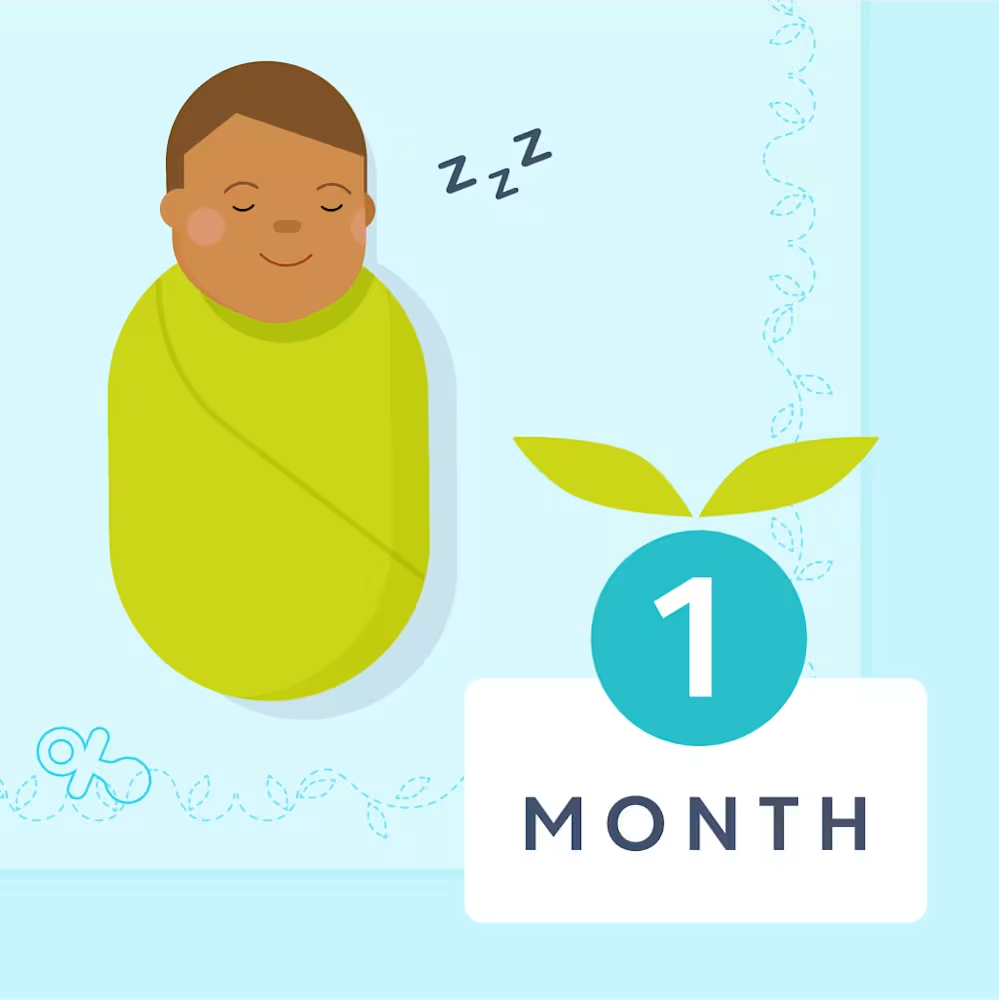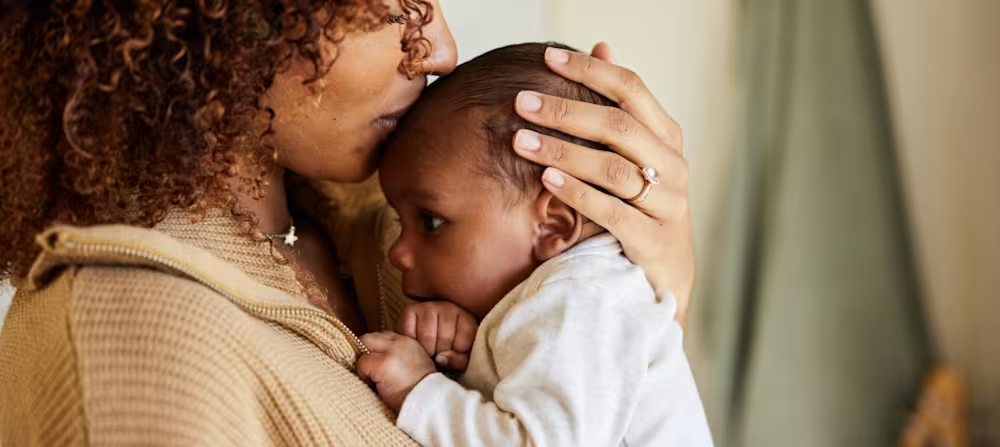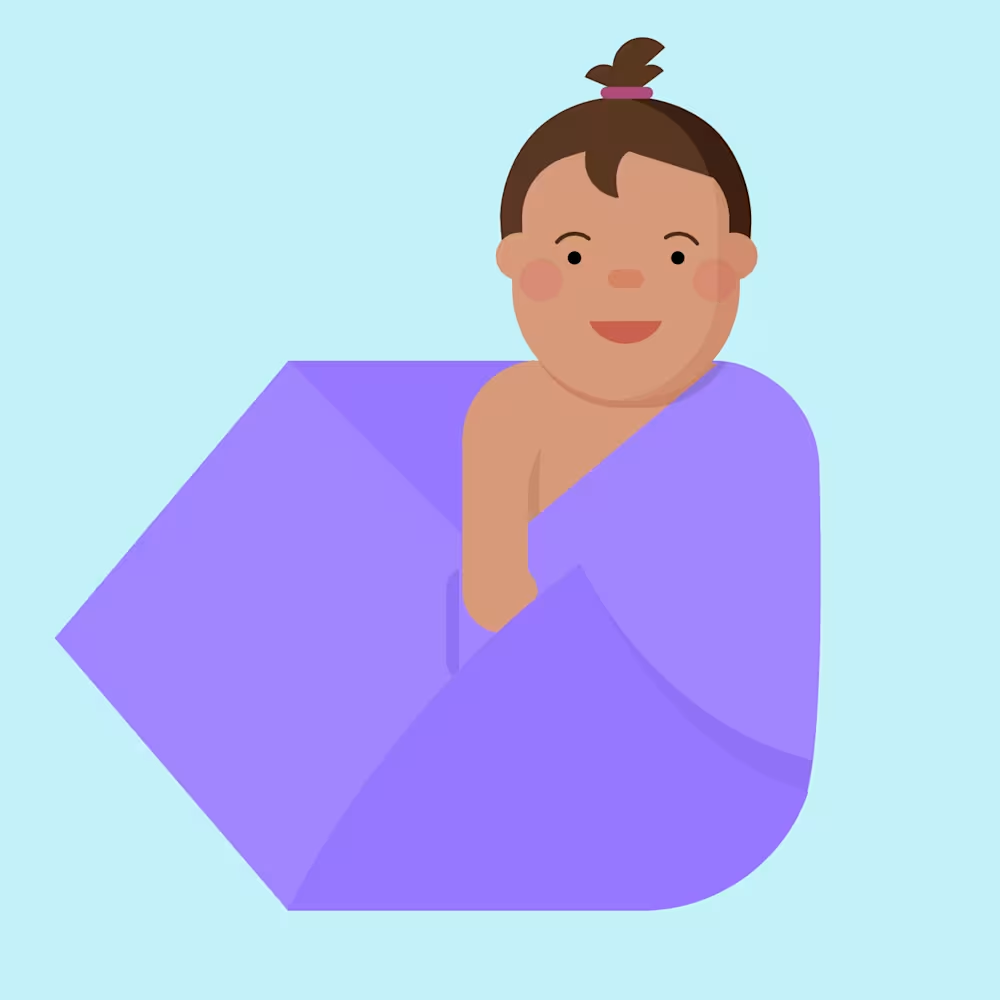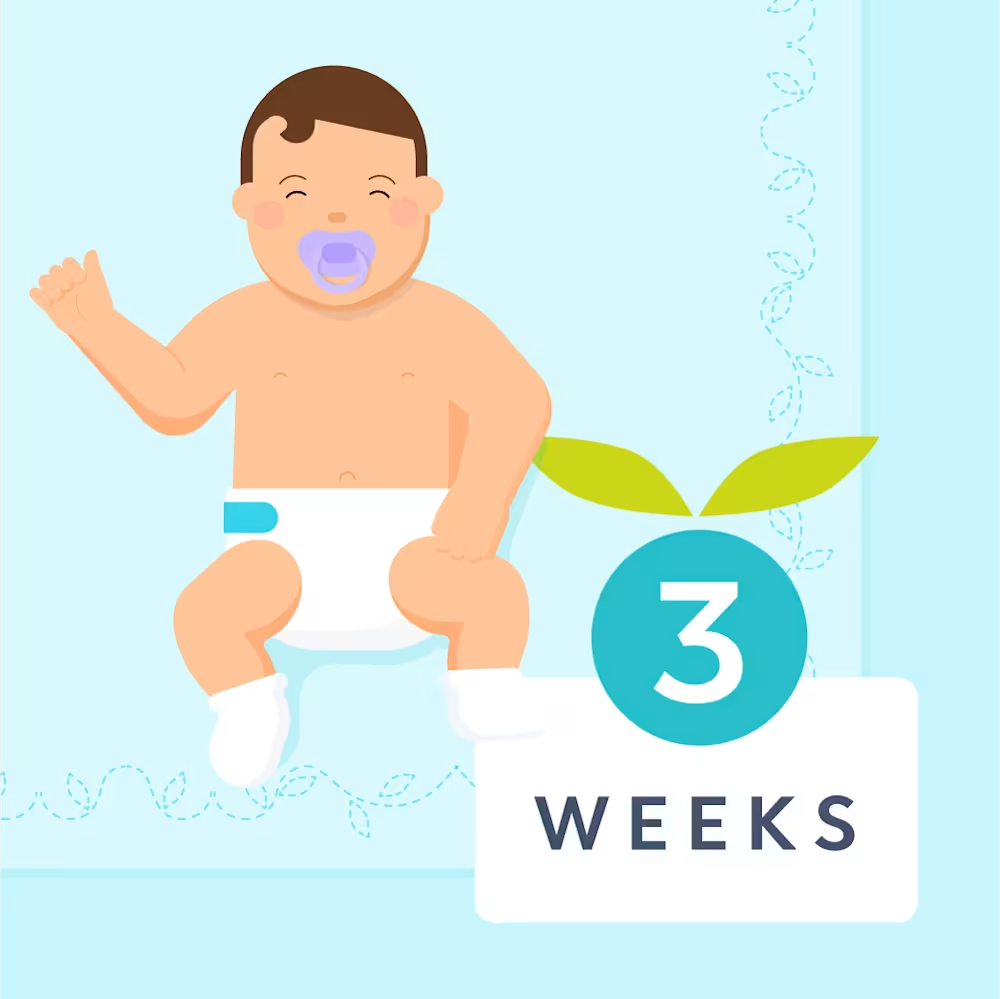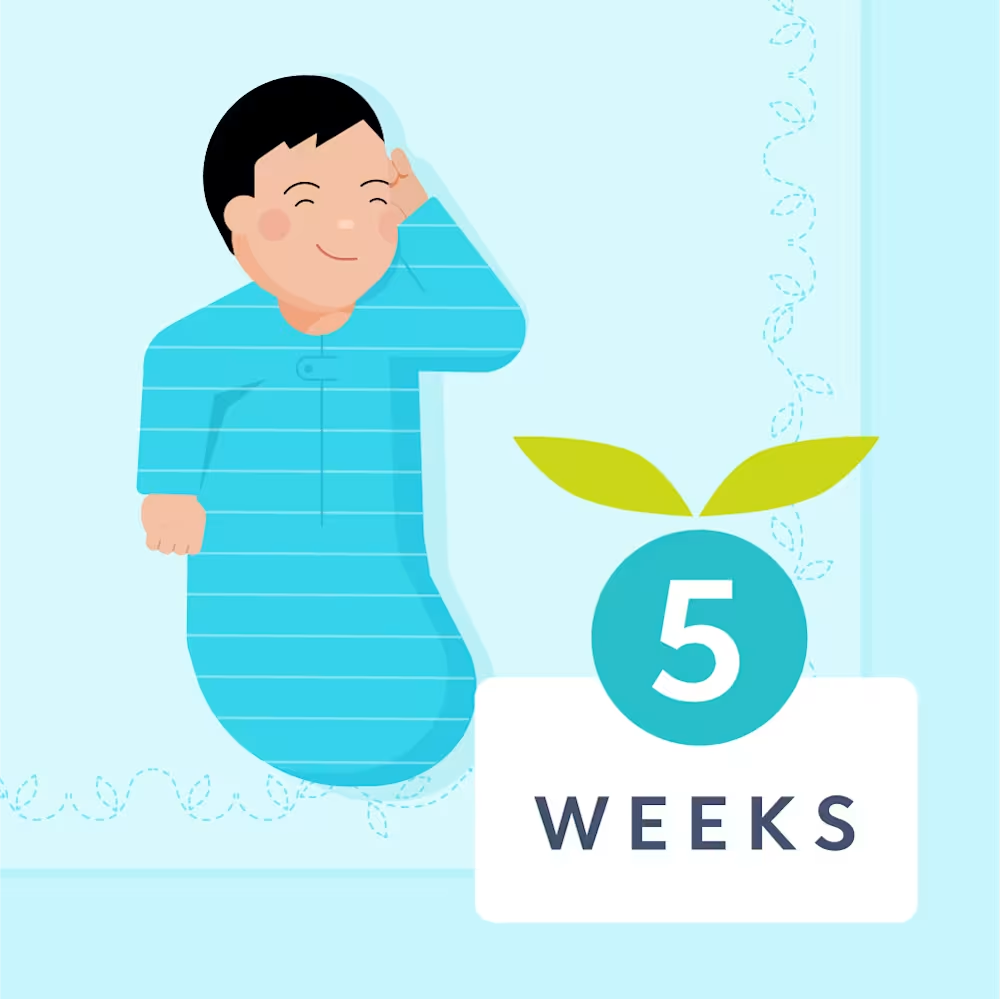2 week old sleep schedule: Bedtime and nap schedule
Updated Dec 15, 2025
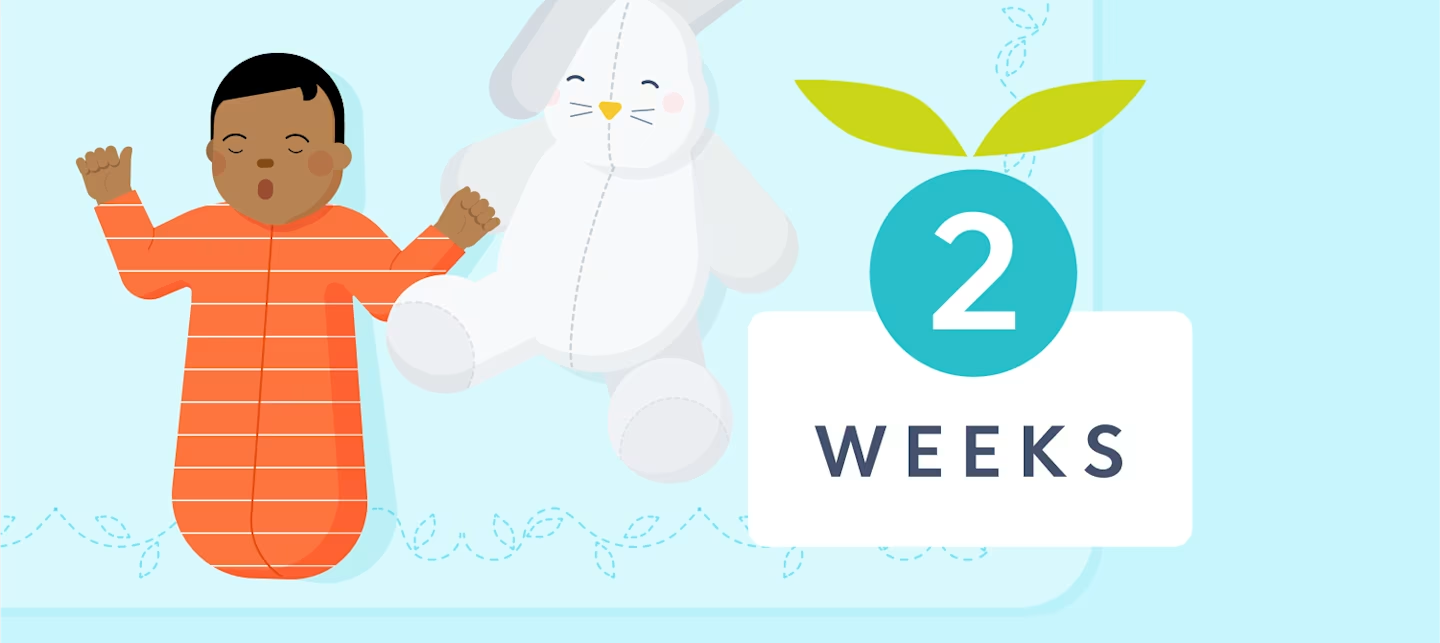
At 2 weeks, you’re probably already beginning to wonder if you’re doing everything “right” because your little one’s sleep is all over the map. We’re here to reassure you that, yes, this is very much expected newborn sleep behavior. It’s hard work being a newborn and it’s normal to see short and long periods of sleep over 24 hours. We won’t expect much predictability when it comes to sleep until after they reach 3 - 4 months old.
In this article, we’ll give you tips for knowing when your 2 week old may need to sleep again, help you understand how long your little one may stay awake at a time, and provide answers to frequently asked newborn sleep questions.
How much should a 2 week old sleep?
Newborns sleep a lot in the first few weeks and months of life. We hope to see around 15.5 hours of sleep at around 2 weeks old, but it’s not uncommon for babies to sleep more or less than this. According to the American Academy of Pediatrics (AAP), newborns sleep around 16 - 17 hours per day []. That said, the frequency and duration of sleep stretches at this age are still highly variable. Some stretches of sleep may be 30 minutes while others may be 2 hours — both are normal at 2 weeks.
Babies typically don’t have typical 24-hour cycles of eating and sleeping until closer to . Even then, we don’t recommend putting your baby on a “by the clock” sleep schedule until or older, when their circadian rhythm becomes more developed.
At this age, you may expect that your child can comfortably stay awake for around 30 - 90 minutes. It probably seems like all you have time to do is feed your little one, change their diaper, and do a little tummy time before they’re ready to snooze again. This is normal newborn behavior — rest assured you’re doing everything “right.” Babies at this age are still adjusting to life outside of the womb and it’s exhausting work!
Keep in mind that these recommendations are estimates — there’s a range of what’s normal and healthy when it comes to baby sleep. Instead of only focusing on the number of hours your baby sleeps, we recommend keeping an eye on their mood and energy levels each day. Their overall demeanor can be a great way to gauge if they’re getting enough rest.
Here's a quick overview of what you may expect when it comes to 2 week olds and sleep. Note that these figures are averages and should be used as guidelines.
Sample schedule for 2 week olds
At 2 weeks, your little one's "schedule" will likely still be unpredictable. Sleep times and durations will vary and this is normal! Here's what a day in the life of a 2 week old newborn may look like:
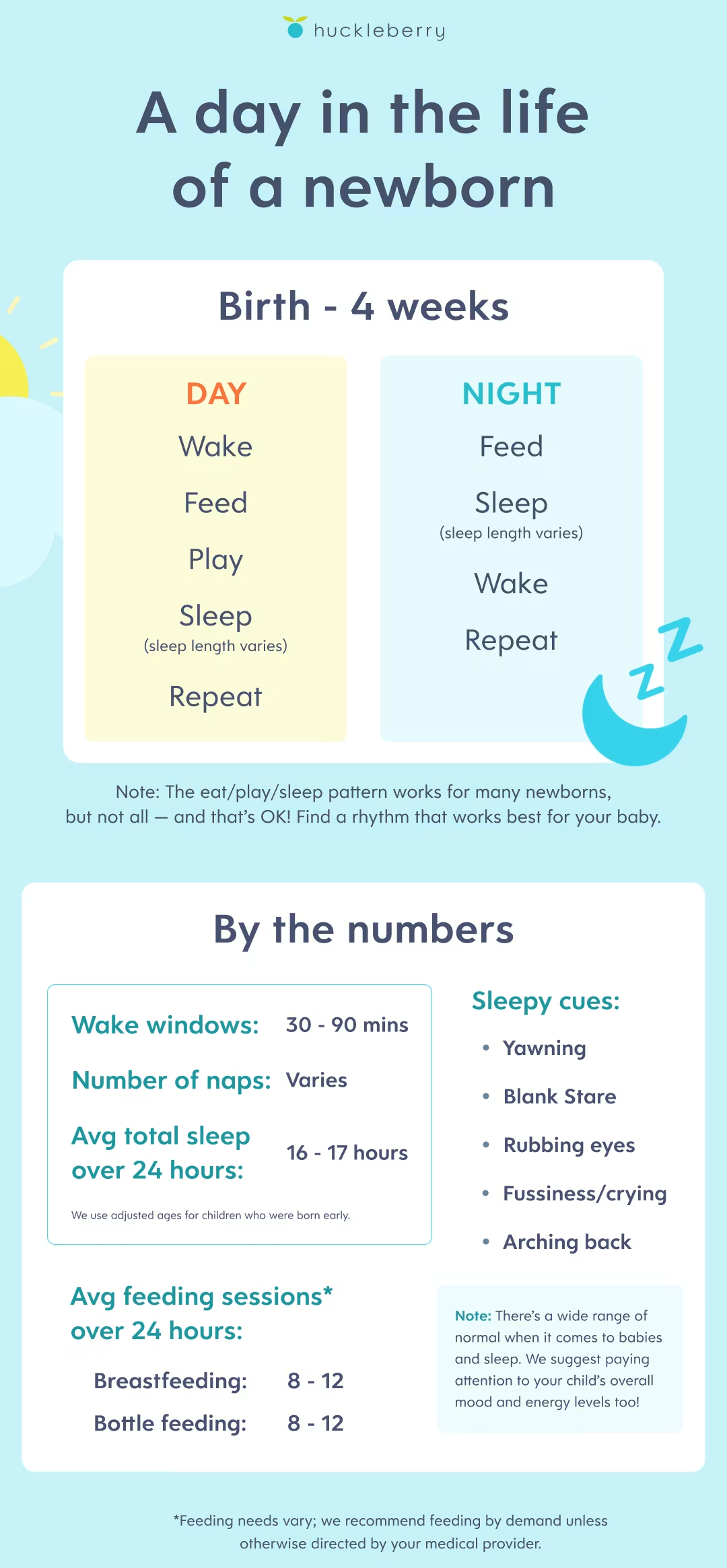
Top sleep tips for 2 week olds
We recommend feeding your newborn on demand when they show hunger cues (also called responsive feeding []), whether they’re bottle-fed or breastfed. It can be hard for hungry babies to sleep so ensuring their tiny tummies are full can help them get the shuteye they need to grow and develop.
If you’re concerned about whether or not your newborn is getting enough to eat, a good indicator can be their number of wet diapers in a 24-hour period. Usually babies have 5 - 6 wet diapers per day [] after the first 5 days of life.
Note that if your baby was born early or has certain medical conditions, you’ll want to consult their medical team about feedings that suit their unique needs. For instance, some premature babies may need scheduled feedings instead.
Naptime schedule for 2 weeks
How long should a 2 week old nap?
Naps will be at 2 weeks old. Babies aren’t born with predictable or organized sleep cycles [], which means you may see a 30-minute nap during the day and the next one may be two hours. Both are considered “normal” at this age.
Since sleep is so unpredictable in the newborn period, we recommend considering wake windows and sleepy cues when determining when your little one may need to snooze again. Babies can typically comfortably stay awake for around 30 - 90 minutes in their first month of life before being ready for sleep again.
Also watch for sleepy signs, which include:
Yawning
Staring off into space
Getting fussy
Rubbing their face on you
These signs may indicate that your child is ready to sleep.
The absence of a can be tricky, but we encourage you to take advantage of the sleepiness and flexibility that also comes with this phase. Newborns can usually fall asleep when you’re out and about pretty easily. Just be sure to follow safe sleep practices and move your baby to a firm surface to sleep on their back as soon as possible, as recommended by the AAP [].
How many naps for a 2 week old?
Sleep is controlled by sleep pressure and hunger at 2 weeks, so we won’t see a specific sleep schedule or number of naps at this time. In the first few months of life, your child will likely have short and long periods of sleep along with plenty of wakings for feedings and comfort over a day (and night!).
Looking ahead, most babies are taking around 4 - 5 naps per day. However, there’s still lots of variability [] when it comes to nap times and durations at this age as well. This is expected. Your child will be ready for a more regular sleep schedule when their circadian rhythm develops and they grow and can comfortably for longer periods.
Bedtime for 2 week olds
What time should a 2 week old go to bed?
Does it feel like your baby snoozes all day and then is wide awake when it’s your preferred bedtime? It’s not uncommon for newborns to confuse night and day []. Luckily, this usually resolves on its own at around . Aim to keep interactions dark and quiet overnight for activities like feedings and diaper changes to signal that nighttime is for sleep []. On the other hand, keeping your baby’s environment bright and noisy during the day may help too.
When it comes to a newborn’s “bedtime,” don’t be surprised if their longest period of sleep in a 24-hour period starts on the late side — possibly after 10:00 PM! — since sleep is still so irregular. Fear not, most babies will be ready for an earlier bedtime at around .
Why does my 2 week old keep waking up at night crying?
It’s completely normal for a 2 week old to wake multiple times throughout the night. At this stage, frequent waking is expected as babies need to feed often and seek comfort. Most infants aren’t physically ready to until they are closer to 6 months old.
Is there a sleep regression at 2 weeks old?
Although changes in sleep can happen at any time, major typically occur around 4 months, 8 - 10 months, 12 months, 18 months, and 2 years. These often align with big developmental changes. If your newborn’s sleep suddenly shifts, it’s more likely due to , cluster feeding, or adjusting to life outside the womb rather than a true regression. It’s completely expected that your 2-week-old will wake frequently both day and night during the first few months. By around 3 to 4 months, many babies begin settling into a more predictable 24-hour sleep and feeding cycle.
Can my 2 week old use a pacifier while sleeping?
Pacifiers can be introduced from birth, though if you’re breastfeeding, some experts suggest waiting a couple of weeks to ensure feeding is well-established. The American Academy of Pediatrics (AAP) recommends holding off on pacifier use until nursing is going smoothly, which is usually around 3 to 4 weeks []. However, there is limited evidence supporting the idea that introducing a pacifier early causes “nipple confusion" []. Pacifiers may offer several benefits, including soothing your baby and lowering the risk of sudden infant death syndrome (SIDS). They are also commonly recommended for preterm or low-birth-weight babies to help with their sucking reflex.
Should I swaddle my 2 week old?
can help newborns feel secure and sleep better by preventing them from being startled awake by the Moro reflex []. Since newborns have an immature startle reflex, swaddling can create a sense of comfort and potentially lead to longer sleep stretches.
According to AAP safe sleep recommendations, babies should always be placed on their backs to sleep, whether swaddled or not. It’s also important to use a “hip-healthy” swaddling technique [], allowing your baby’s legs to bend up and outward freely to prevent hip dysplasia. Once your little one starts showing signs of rolling over, which can happen as early as 2 months, it’s time to stop swaddling.
Can I sleep train a 2 week old?
is not recommended for newborns. At 2 weeks old, babies have not yet developed the ability to consistently self-soothe, so they rely on external comfort to fall and stay asleep. It’s completely normal for infants at this age to need frequent help with sleep. However, if your baby will only sleep while being held and you’re looking for gentle guidance, we can provide age-appropriate strategies to help build a healthy sleep foundation.
Can a 2 week old sleep on their stomach or side?
Unless advised by a healthcare provider, a 2 week old should always sleep on their back. The AAP’s safe sleep guidelines [] recommend placing newborns on a firm, flat surface for all sleep, including naps. Once your baby is able to roll independently in both directions (back to front and front to back), usually in a few months, you won’t need to reposition them if they roll during sleep.
What are the developmental milestones for a 2 week old?
At 2 weeks old, your baby is primarily focused on eating and sleeping and hasn’t yet developed physical skills like rolling or sitting. Instead, they are learning about the world through sight, sound, and smell while also bonding with their caregivers. During the here are some key milestones to look for:
Regains birth weight by about 2 weeks, then begins gaining weight consistently
Brings hands near the face and mouth
Keeps fists clenched most of the time
Displays reflexes such as rooting, sucking, Moro (startle), grasping, and stepping
Does a 2 week old need to eat during the night?
It’s completely normal for newborns to . At 2 weeks old, your baby’s stomach is still very small, so they can only consume 1 to 2 ounces per feeding []. Because of this, they need to eat frequently, both during the day and at night, to get enough nourishment. If your baby is typically in their sleep space from 10:00 PM to 7:00 AM, they will likely need to feed at least 2 to 3 times (or more) overnight.
As your baby’s stomach grows and they are able to take in larger amounts of milk at once, they may begin sleeping for longer stretches between feedings. However, it’s still uncommon for babies younger than 6 months to sleep through the night without waking to eat [].
Takeaway
Newborn sleep can be unpredictable! Since babies aren’t born with established sleep-wake cycles, they don’t typically follow a set sleep schedule or have consistent sleep durations or frequencies. Most babies begin to develop more regular 24-hour sleep and feeding patterns around 3 - 4 months.
To determine when your newborn is ready for sleep, we suggest watching for sleepy cues and using wake windows as a guide. Additionally, consider observing your baby’s overall mood and energy levels rather than focusing solely on the total number of sleep hours to assess whether they’re getting enough rest.
It’s completely normal for newborns to wake throughout the night for feeding and comfort. At this stage, sleep is primarily influenced by sleep pressure (homeostatic sleep drive) and hunger, meaning frequent waking to eat— both during the day and overnight — is expected.
If you're curious about what lies ahead in the next month, glimpse into the future to see what you might experience once your baby is . Take a look back at how far your baby has come by revisiting what they may have been like as a .
Share article:
Note: The content on this site is for informational purposes only and should not replace medical advice from your doctor, pediatrician, or medical professional. If you have questions or concerns, you should contact a medical professional.
16 Sources
Share article:
